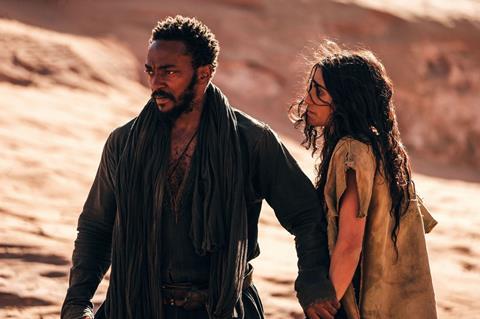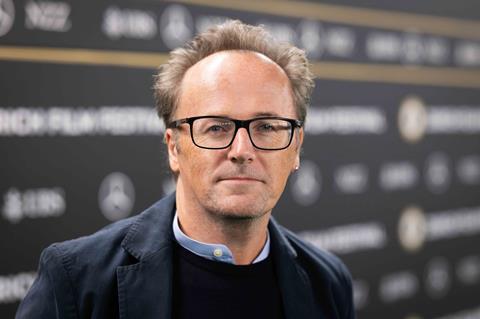
UK filmmaker Rupert Wyatt is the director of historical epic Desert Warrior, the first big-budget feature to shoot in Saudi Arabia.
Made for a reported $150m with a cast led by Anthony Mackie, Aiysha Hart and Ben Kingsley, Desert Warrior world premiered earlier this month at the Zurich Film Festival after a long journey to the screen. Filming began in 2021 in the spectacular mountains and deserts of Saudi Arabia’s Tabuk province.

UK filmmaker Wyatt, whose credits include Rise Of The Planet Of The Apes, left the project at the post-production stage for a period amid reports of creative differences with the film’s Saudi producer MBC Studios – but was later asked back to complete his version of the film.
Set in 7th-century Arabia, the film tells the story of feuding tribes uniting against the Sassanid Empire, leading to an epic showdown.
MBC Studios produced with Jeremy Bolt’s US-based JB Pictures. AGC International handles worldwide sales. The film received support from the Saudi Film Commission’s Cash Rebate Programme.
How did you get involved?
The producer Jeremy Bolt and I had started to develop a project about the Battle of Britain that never came to fruition. During that time, he had started to work with MBC, run by Pete Smith. Pete and Jeremy had worked before on Shopping, the [1994] Jude Law film. They wanted to make an original IP based on a true story of the birth of Arabia. I was first approached about it in 2019.
We were initially based in Dubai, and we scouted all over from Jordan to Saudi Arabia to UAE. But it became clear very quickly that we needed to hub in one place. We ultimately found an area in northwest Saudi Arabia, right near the Jordanian border, called Tabuk.
It had amazing infrastructure for living but not for filmmaking – there was no filmmaking infrastructure there at the time. That’s now changed. The idea was essentially for us to plant our flag there, and build everything from scratch and stay in this one place.
So how was it?
For all intents and purposes, we were totally on our own. We realised quickly that while there was a huge amount of enthusiasm and really interesting minds and talents there, no one had ever tried to make a film like that.
So we had to do it from the ground up. We brought everything in, and we ended up with about 40 different nationalities working on the film. There were 600 of us, not including cast and extras. We all stayed in one hotel, the Millenium, right on the edge of the desert. Every day, we would just journey out and find our locations. We had a base camp that was about 40 minutes from the hotel, and then we would take off in 4x4s into the desert.
What was the biggest challenge?
That it was all largely in camera. We did a lot of our storytelling on the ground. For the final battle, we had to bring in hundreds of additional people as well as camels and horses.
When you shoot in the desert these days, you can thankfully paint all of the [sand] tracks out – unlike Lawrence Of Arabia days where they had a small army of sweepers. But it’s still a big challenge because after one take, everything is wrecked. So we would have to flag everything off, keep it as pristine as possible, and then gradually move into it with shots. It was a technical challenge like I’ve never experienced.
What about the heat?
It was about 120 degrees on day one. It wasn’t so much the heat that was the problem though; it was the UV levels. We would layer up and cover ourselves, but we’d still get sunburned.
We also had to pay particular attention to working with animals in that heat. Thankfully, we had no injuries or accidents. We would do two takes and then the horses would get taken to water.
How does it compare to some of the other films that you’ve made?
The scale of it was very different. I did one of the Planet Of The Apes films. As big as that was, it was more like a character drama because all of our work in terms of the scale was done in post. This was something else.
Can you talk through the reasons it has taken so long to come to the screen?
The simple answer is that if you take out the year-and-a-half where I wasn’t involved in the film, then actually we had a pretty straightforward process to the screen.
My experience making the film was incredible. That was in no small part down to Jeremy as my producer, who was incredibly tenacious. We tried to do something new in a world that hadn’t been trained in that way. It was his tenacity and that of the crew that made this happen. We only went two days over schedule. Our crew, our cast, were incredibly united.
Where it got complicated for me was around the time I was delivering my cut of the film. Pete Smith had left MBC and was replaced by somebody else. Whether it was her or whether it was MBC who had ideas of what the film could or should be, it started to shift – and it became challenging.
I stood my ground as I do as a filmmaker, and wanted to follow through on what our intentions were. There was nothing political in terms of their intentions. There were obviously some cultural thoughts and considerations they wanted to take into account.
But in my opinion, as a white male person not from that region and not from that culture, the whole intention of the film, because we made it in English, was to make a human story. I approached it as Peter Weir would approach making Witness or Wim Wenders would make Paris, Texas.
It was my outsider’s eye, trying to tell this story in the best way that I could see as a filmmaker and a storyteller. But obviously, like many films, there were commercial considerations and there were length considerations.
Frankly, it was very frustrating for me to be removed from the film. Whatever they intended to do, I guess, did not work. So they invited me back a year ago. We had a few months to just recut it and bring it back to where I’d hoped it to be.
What’s next for you?
During the hiatus period, I went off to Paris to make an animated feature film about a couple who were Nazi hunters, the Klarsfelds. It’s an adult animation about their love story and their life, bringing Klaus Barbie to justice. That’s been an amazing experience, totally different, with a tiny budget. Diane Kruger, Brian Cox and Yvan Attal are the three leads. Then I’m making a film next year with Woody Harrelson called Boxman for Lionsgate.















![[L-R]: Amanda Villavieja, Laia Casanovas, Yasmina Praderas](https://d1nslcd7m2225b.cloudfront.net/Pictures/274x183/6/4/1/1471641_pxl_20251224_103354743_618426_crop.jpg)



![Kindred Spirits [4] Horizontal Image[9]](https://d1nslcd7m2225b.cloudfront.net/Pictures/100x67/6/9/4/1473694_kindredspirits4horizontalimage9_45584.jpg)





No comments yet